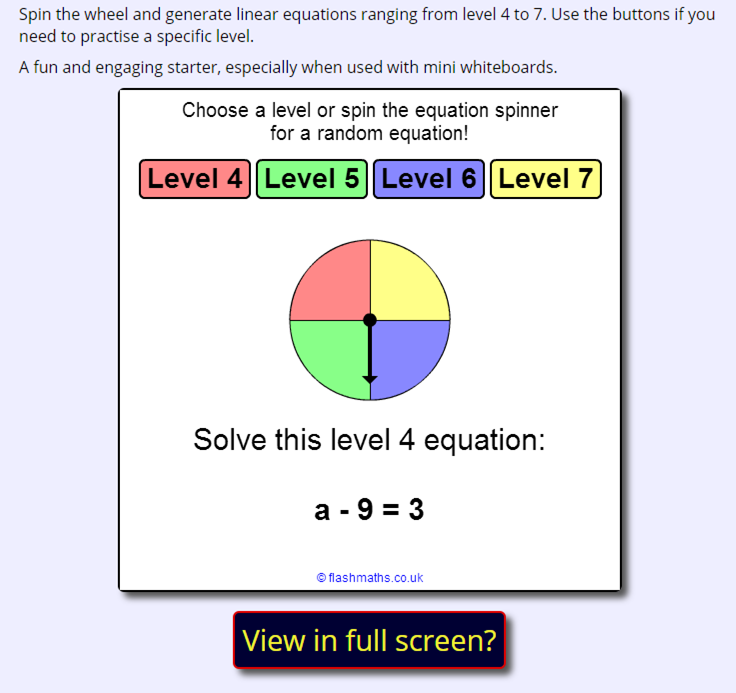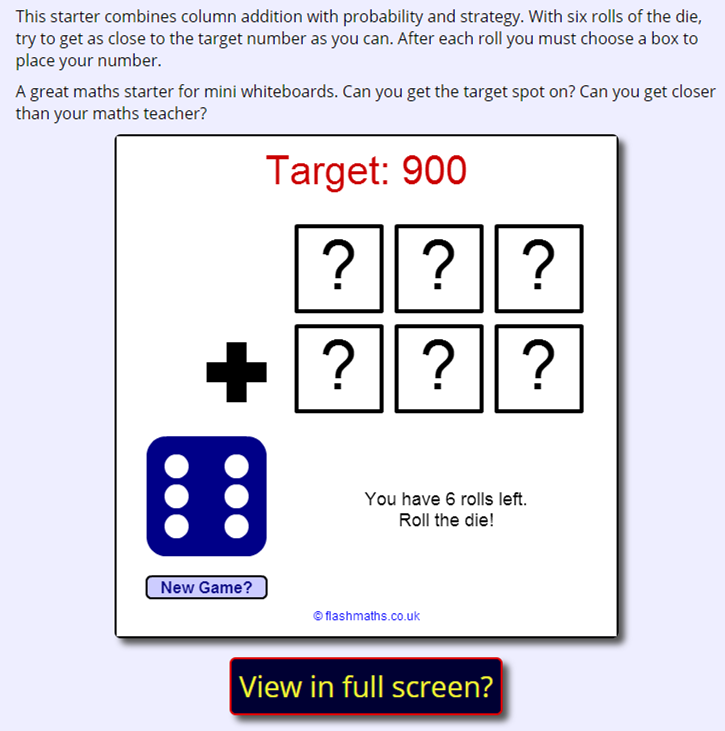Top 5 for public-domain images20/5/2016 While the Internet is possibly the best thing that's happened to teaching and education in the last thirty years (think TES resources, Twitter, independent sites, quick communication channels), it also comes with a minefield of copyright issues. A couple of weeks before I left my last job, an email went round to all staff reminding them of copyright issues with downloading and using images from the Internet - and I used to be as guilty of this as the next person. When planning a lesson, it's very easy to just Google and pull in an image from anywhere to jazz up a PowerPoint - accessing images from all over the world means that you can easily illustrate a point about real-life applications of the mathematics pupils are studying. However, with the prevalence of online resource sharing, it's more important than ever to make sure that images used and redistributed are actually done so legally.
Doing some proper problem-solving15/9/2015 Pick of Twitter 06/09/156/9/2015 Useful tools for website developers5/9/2015 I've had my website in some form for about three years now; I created my original site using Weebly as my knowledge of HTML was (and still is) fairly limited, and I was more interested in quick functionality than building everything from scratch.
As I've gone along, I've found loads of places with useful information or gizmos for amateur website designers and developers, so thought I'd share a few in this post. These are just the ones I use and find helpful - there are plenty of others out there! I'm going to keep this list open and continue to add to it as I find (or remember) more useful stuff. Google Trends29/8/2015 A quick post tonight to share Google Trends, an interesting little web app from Google that allows you to explore what people have been searching for online. I discovered this site a few years ago, and it's great for getting some interesting real-life data and graphs for short discussions in the classroom.
Six good comics and one good thing27/8/2015 Three new blogs!26/8/2015
I mentioned in my Pick of Twitter a couple of weeks ago that I'd found a link to blog post prompts. Well, we're on post 40 of 51 now, and I'm getting writer's block, so thought I'd pick a prompt and go with it for today's post. I thought this one looked interesting:
Read 3 posts from blogs you’ve never visited, give a quick take-away from each.
This seemed an opportune moment to refer to the recently created Maths Echo Chamber Twitter account (@MathsEcho) so I popped over to do a bit of random selection.
Top 5 for worksheets20/8/2015 Sometimes, you really need a basic practice worksheet - pure and simple, drill and kill, no fuss or problem solving. This might be for a five-minute heads-down skills practice in class, to source questions for a revision lesson, or simply to satisfy the rare pupil who asked where they can go to get extra work.
I use textbooks less and less in my teaching now, and I find that the exercises in most new textbooks aren't great for what I want out of the lesson. If I want basic skills practice, there's often bits in there I don't want the pupils doing (such as a substitution exercise which uses negative numbers before they've been taught this), and then there's the irritating bit of explaining that they need to start on Q3 and do up to Q5, then move on to Q21 on the next page, and it's all more trouble than it's worth. And let's not talk about having to hand the flipping things out... Top 5 for rich tasks and problem solving19/8/2015 If you're a regular Twitter user, there's nothing revolutionary on this list - these are the sites that I check first before scouring the Internet for other problems, and that's because they've usually got something great that requires little adaptation for the classroom.
However, if you're a regular Twitter user but you know colleagues who aren't, I really recommend sharing this list with them, as it may be that they've never heard of some. I'm going again... (and Facebook)18/8/2015 I'm afraid it's another quick #summerblogchallenge post today as I've been pre-writing a load more meaningful posts for the next few days - I'm disappearing off to a festival this weekend, so will be employing Twuffer for a bit more time-travelling blogging.
If this, what next?17/8/2015 A couple of days ago, @mathedup mentioned using IFTTT (If This Then That) for automating post sharing between Twitter and Facebook. I'm not a big user of Facebook for teaching stuff (yet), but was intrigued by the title of the app, so decided to go and have a play, mostly in preparation for setting up my own Facebook page soon.
I quite like playing around with technology, and, as I only got a smartphone a couple of years ago and my tablet about six months ago, the world of apps is relatively new to me. So I've quite enjoyed messing with IFTTT this afternoon - depending on what's ended up being useful, I'll post some more in-depth tutorial-type things later. Top 5 for starters7/8/2015 I wrote a post a while back about my philosophy on starters, so thought I'd supplement it with a post about great websites for no-fuss five-minute activities. Most of the starters on these sites require very little or no preparation, so can be used off the cuff. So, in no particular order, here are my top sites for starters:
You know those people that seem to post all the time on Twitter? I've discovered their secret - for me, it was a bit of a necessity if I'm going to manage the #summerblogchallenge, as I got married yesterday and currently have a houseful of people continuing the celebrations until at least Saturday**.
It's a handy little site called Twuffer - you sign up for free with your Twitter account, then simply schedule a Tweet in advance. If you want to schedule a link to a blog post that's not live yet (as I've been doing), you might need a little jiggery-pokery with the url of your post, but it's fairly simple to work out. Something old, something new...29/7/2015 I'll admit to having to cheat a little bit on this challenge; this post is one of the few I had to write ahead of time and schedule to post later. I have a good excuse - I'm getting married today, and I imagine that, even though my fiance is very understanding about the amount of time and energy I put into teaching, even he would object if I blogged during our wedding day.
While I've been organising over the summer, I realised that my resource collection has grown exponentially again this year. I made the move to storing resources electronically this year, which has meant I'm drowning in far fewer bits of paper and it's much easier to find the worksheet I want than rifling through folders. Despite this, I still have my entire cupboard under the stairs full of bits and pieces that need transferring or updating - I think it's going to be an endless task. Finding, developing and trying new resources is one of my favourite parts of teaching, which is one of the reasons I started the resources pages on my site - it's far easier to link to a page at home, then find that again at school, rather than email things to myself, which I then forget about the following year. As above, this project is still unfinished, but I hope to put a big dent in it over the next few weeks. But what makes a good resource? Planning for GCSE 201521/7/2015 Just a quick post today with a few useful goodies for the new Maths GCSE - these are all links I've found useful in planning and resourcing our schemes of work.
Pick of Twitter 09/05/15 and 16/05/1517/5/2015
Lots of brilliant stuff this fortnight! I'm adding all the fantastic lesson ideas and resources to the Resources by Topic index, but it's a very slow process. I'm hoping to get all the pages done for September 2015. I particularly enjoyed this week's #mathsTLP - I managed to miss the previous one as the bank holiday confused the days for me.
Following my trawl through the xkcd archives to find my favourite comics for A Level, I thought I may as well post some that may be relevant for KS3 and GCSE. There are plenty of funny graphs and pie charts (great for the last five minutes of a lesson), and a few topic-related strips.
This post contains a few percentages comics; while they're quite funny, they also have quite a bit of mileage in terms of mathematical discussion, particularly "Hand Sanitizer" and "Fastest Growing". Clicking on each picture will take you to the xkcd site, where you can get larger resolution versions. xkcd strips for A Level22/3/2015 If you haven't heard of xkcd (click now and lose three hours), it's a webcomic run by Randall Monroe focusing on maths, science and computing. Although some of his comics (mostly the coding ones) go over my head, the maths-based ones are hilarious, and some are great for sharing in lessons - with the caveat that some do contain naughty jokes, so check first. Here's my pick of a few particularly relevant to the A Level syllabus:
Flash Maths5/2/2015 Just a quick post to say I've just found an excellent site for quick starters and practice - Flash Maths is chock full of Flash applications for generating questions on loads of different topics. A five-minute poke-around unearthed these little gems: Substitution Grids
|
Categories
All
Archives
August 2020
|
















 RSS Feed
RSS Feed
